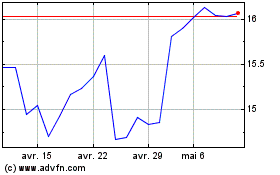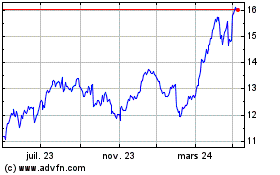By Jonathan Cheng in Seoul and Kane Wu in Hong Kong
This time last year, South Korean private-equity firm MBK
Partners LP was shopping around a rich prize--the South Korean
operations of ING Groep NV, which it had acquired in 2013 as part
of a planned downsizing of the Amsterdam-based financial giant.
Among the final bidders was a trio of Chinese players:
state-owned China Taiping Insurance Holdings Co., Shanghai-based
conglomerate Fosun Group and private-equity firm JD Capital, people
familiar with the matter said at the time.
But as South Korea's government finalized its plans to deploy a
U.S. missile-defense system that is fiercely opposed by Beijing,
the Chinese bidders got cold feet, telling MBK that they would wait
for a better opportunity, according to people familiar with the
matter.
Months later, that better opportunity hasn't arrived. So on
Thursday, MBK's executives will begin a global roadshow for an
initial public offering of ING Life Korea, in hopes that it can
sell the company to smaller investors. The deal could value the
company at nearly $3 billion.
MBK's abrupt change of tack highlights the broad ripples being
felt by the worsening geopolitical standoff over North Korea's
nuclear and missile program, which has prompted Washington and
Seoul to push ahead with the controversial missile-defense system,
called Terminal High-Altitude Area Defense, or Thaad.
On Wednesday, Gu Zhipeng, vice president of JD Capital's parent,
Jiuding Group, confirmed that the company would no longer be
involved in the acquisition of ING Life Korea. He said the company
couldn't proceed because of the recent deterioration in relations
between China and South Korea. Mr. Gu added that none of the
group's subsidiaries or the group itself have plans to invest in
South Korea. China Taiping said it had nothing to disclose in
relation to ING Life Korea. Fosun declined to comment.
Lotte Group, South Korea's fifth-largest conglomerate and the
owner of the golf course in South Korea that will host the Thaad
battery, has also been in China's crosshairs. Chinese authorities
have shut down dozens of Lotte stores in mainland China in apparent
retaliation for its role in deploying the missile-defense
system.
Thaad is expected to be a major topic of discussion when Chinese
President Xi Jinping arrives in Florida for a two-day summit
meeting with U.S. President Donald Trump. On Tuesday, 26 U.S.
senators signed a letter calling on Mr. Trump to push back against
any Chinese retaliation related to Thaad deployment.
Separately, the Chinese government has also imposed capital
controls on many of its own companies, preventing some potential
buyers from pursuing already-tough deals.
Beijing is seeking to tighten control on money flowing out of
the nation, concerned that such capital flight could shake
confidence in its economy and potentially weaken the yuan, after a
record year of overseas deal making by Chinese companies. Last
year, Chinese companies announced overseas deals worth a collective
$217 billion, according to Dealogic.
Jiuding Group's Mr. Gu said Beijing's new capital-control
measures were also a factor in its decision not to proceed with the
acquisition of ING Life Korea.
The new geopolitical hurdles to deal making are an extra
headache for private-equity companies in Asia, which have looked
increasingly to Chinese entities as some of the biggest potential
buyers. Even when Chinese players don't win, their participation in
sales can push up the value of bids.
Beijing-based Anbang Insurance Group Co., which has turned heads
with its aggressive bids on flashy hotel properties and for its
ties with Mr. Trump's son-in-law, Jared Kushner, has been
particularly active in South Korea's insurance market.
Last year, Anbang bought the South Korean operations of
Germany's Allianz SE for $3 million in a deal that won regulatory
approval late last year. In 2015, Anbang bought control of South
Korea's No. 8 insurer, Tong Yang Life Insurance Co., for $1
billion.
MBK, which was set up in 2005 by a team of former executives
from Carlyle Group LP led by Michael B. Kim, bought ING Life Korea
from its Dutch parent company for $1.6 billion in 2013.
Last year, MBK, which has $14.6 billion of capital under
management, hired Morgan Stanley to sell South Korea's
fifth-largest by assets at an asking price of more than $3
billion.
ING Life Korea, which has about 30.7 trillion Korean won ($27.2
billion) in assets, is considered one of the most attractive
financial assets in South Korea, with a strong capital base, a book
value of about 5 trillion won and net income last year of 290
billion won.
Some of the potential Chinese buyers haven't formally withdrawn
from the process, but they have asked repeatedly for more time on
the bid, the people said, and could bid for the 59.1% majority
stake that MBK will hold in ING Life Korea even after floating
40.9% of the company in the IPO.
Write to Jonathan Cheng at jonathan.cheng@wsj.com and Kane Wu at
Kane.Wu@wsj.com
(END) Dow Jones Newswires
April 05, 2017 07:31 ET (11:31 GMT)
Copyright (c) 2017 Dow Jones & Company, Inc.
ING Groep NV (EU:INGA)
Graphique Historique de l'Action
De Mar 2024 à Avr 2024

ING Groep NV (EU:INGA)
Graphique Historique de l'Action
De Avr 2023 à Avr 2024
